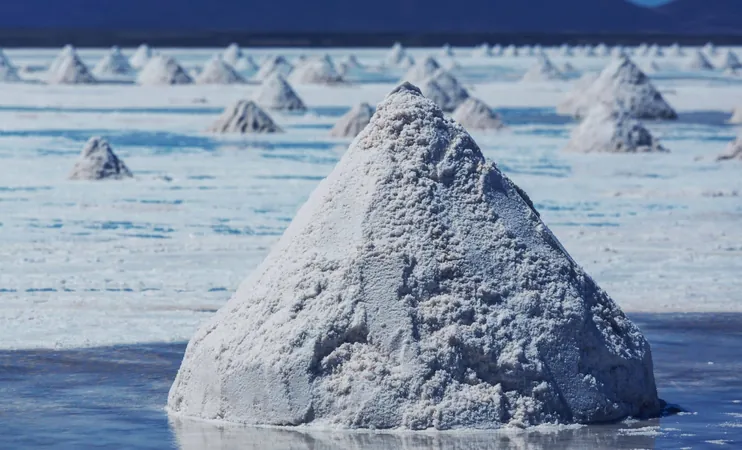
Unlocking the Secrets of Lithium: A Groundbreaking Discovery Beneath Earth’s Largest Reserves
2025-06-05
Author: Noah
A Game-Changing Revelation in Lithium Extraction
A groundbreaking study has just unveiled a startling fact about lithium-rich brines: their chemistry is largely influenced by boron, not the previously assumed carbonate. This revelation could revolutionize the future of lithium mining and transform how wastewater from extraction is managed.
Beneath the Surface: The Unexpected Chemistry of Lithium Brines
Research published in *Science Advances* has challenged our conventional wisdom regarding global lithium sources. Lithium, essential for the renewable energy revolution, is commonly extracted from underground briny waters, especially at locations like Bolivia’s Salar de Uyuni—the largest known lithium brine deposit on the planet. Traditionally, saline waters like seawater operate under carbonate chemistry, but this new study illustrates a radically different landscape governed by boron.
"We found that the pH of brines in these regions is almost exclusively dictated by boron, unlike seawater and other typical saline environments. It’s like we’re exploring the geochemistry of another world,” stated Avner Vengosh, a renowned environmental quality professor at Duke University and lead researcher on the project.
Salar de Uyuni: Where Lithium Holds Mysteries
The research team honed in on Bolivia’s Salar de Uyuni, a striking expanse of salt that conceals the world’s largest lithium reserves beneath its surface. In the mining process, brine is extracted from deep underground and pumped into shallow ponds where it slowly evaporates, concentrating its lithium and boron content. Remarkably, the brine samples from evaporation ponds revealed a striking increase in acidity compared to natural brine, thanks to the significant levels of boron.
"By combining chemical analysis with geochemical modeling, we were able to map out the various molecular forms of boron that influence the alkalinity of these lithium brines,” explained Paz Nativ, a postdoctoral researcher on the team.
A New Era for Lithium Mining and Management
This innovative discovery could have profound implications not only for lithium extraction but also for how we think about brine management in mining operations. The findings suggest that adapting to these unique chemical properties could enhance efficiency and sustainability, making lithium mining more eco-friendly.
With lithium being a cornerstone of the energy transition, understanding its chemistry on a deeper level may help in the quest for cleaner energy solutions. Stay tuned, as this new revelation could very well change the game for lithium mining forever!









 Brasil (PT)
Brasil (PT)
 Canada (EN)
Canada (EN)
 Chile (ES)
Chile (ES)
 Česko (CS)
Česko (CS)
 대한민국 (KO)
대한민국 (KO)
 España (ES)
España (ES)
 France (FR)
France (FR)
 Hong Kong (EN)
Hong Kong (EN)
 Italia (IT)
Italia (IT)
 日本 (JA)
日本 (JA)
 Magyarország (HU)
Magyarország (HU)
 Norge (NO)
Norge (NO)
 Polska (PL)
Polska (PL)
 Schweiz (DE)
Schweiz (DE)
 Singapore (EN)
Singapore (EN)
 Sverige (SV)
Sverige (SV)
 Suomi (FI)
Suomi (FI)
 Türkiye (TR)
Türkiye (TR)
 الإمارات العربية المتحدة (AR)
الإمارات العربية المتحدة (AR)